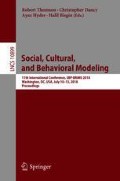Abstract
Sexual abuse – a highly stigmatized topic in the society has spurred a revolution in the recent days especially through the shared posts on social media platforms via attaching the hashtag #metoo. Individuals from different backgrounds and ethnicities began sharing on the online venues about their personal experiences of getting sexually assaulted. This paper makes an initial attempt to asses the public reactions and emotions by utilizing the publicly shared #metoo posts by performing a comparative analysis of the tweets shared on Twitter as well as on Reddit. Though nearly equal ratios of negative and positive posts are shared on both platforms, Reddit posts are focused on the sexual assaults within families and workplaces while Twitter posts are on showing empathy and encouraging others to continue the #metoo movement. The data collected in this research helps in the preliminary analysis of the user engagement, discussion topics, word connotations and sentiment with respect to the #metoo movement.
Access this chapter
Tax calculation will be finalised at checkout
Purchases are for personal use only
Notes
- 1.
Although the term #metoo was originally coined in 2006 by social activists to raise awareness about sexual abuse, it became viral in October 2017, following the alleged sexual misconduct in the Hollywood.
- 2.
- 3.
References
Blei, D.M., Ng, A.Y., Jordan, M.I.: Latent dirichlet allocation. J. Mach. Learn. Res. 3(Jan), 993–1022 (2003)
Gilbert, C.J.H.E.: Vader: a parsimonious rule-based model for sentiment analysis of social media text. In: Proceedings of Eighth International AAAI Conference on Weblogs and Social Media (2014)
Petrak, J., Hedge, B.: The Trauma of Sexual Assault: Treatment, Prevention and Practice (2002)
Tomas, M., Sutskever, I., Chen, K., Corrado, G.S., Dean, J.: Distributed representations of words and phrases and their compositionality. In: Advances in Neural Information Processing Systems (2013)
Goffman, E.: Stigma: Notes on the Management of Spoiled Identity. Simon and Schuster, New York (2009)
Altman, I., Taylor, D.A.: Social Penetration: The Development of Interpersonal Relationships. Holt, Rinehart & Winston, New York (1973)
Cozby, P.C.: Self-disclosure: a literature review. Psychol. Bull. 79(2), 73 (1973)
Joinson, A.N., Paine, C.B.: Self-disclosure, privacy and the Internet. In: Oxford Handbook of Internet Psychology (2007)
Finkelhor, D., Gerald, H., Lewis, I.A., Smith, C.: Sexual abuse in a national survey of adult men and women: prevalence, characteristics, and risk factors. Child Abuse Negl. 14(1), 19–28 (1990)
Coffey, P., Leitenberg, H., Henning, K., Turner, T., Bennett, R.T.: Mediators of the long-term impact of child sexual abuse: perceived stigma, betrayal, powerlessness, and self-blame. Child Abuse Negl. 20(5), 447–455 (1996)
McClain, N., Amar, A.F.: Female survivors of child sexual abuse: finding voice through research participation. Issues Mental Health Nurs. 34(7), 482–487 (2013)
Manikonda, L., Meduri, V.V., Kambhampati, S.: Tweeting the mind and instagramming the heart: exploring differentiated content sharing on social media. In: ICWSM, pp. 639–642 (2016)
Andalibi, N., Haimson, O.L., De Choudhury, M., Forte, A.: Understanding social media disclosures of sexual abuse through the lenses of support seeking and anonymity. In: Proceedings of the 2016 CHI Conference on Human Factors in Computing Systems, pp. 3906–3918. ACM (2016)
Acknowledgements
This research is supported in part by a Google Faculty Research Award, an AFOSR grant FA9550-18-1-0067, the ONR grants N00014161-2892,N00014-13-1-0176,N00014-13-1-0519, N00014-15-1-2027, and the NASA grant NNX17AD06G.
Author information
Authors and Affiliations
Corresponding author
Editor information
Editors and Affiliations
Rights and permissions
Copyright information
© 2018 Springer International Publishing AG, part of Springer Nature
About this paper
Cite this paper
Manikonda, L., Beigi, G., Kambhampati, S., Liu, H. (2018). #metoo Through the Lens of Social Media. In: Thomson, R., Dancy, C., Hyder, A., Bisgin, H. (eds) Social, Cultural, and Behavioral Modeling. SBP-BRiMS 2018. Lecture Notes in Computer Science(), vol 10899. Springer, Cham. https://doi.org/10.1007/978-3-319-93372-6_13
Download citation
DOI: https://doi.org/10.1007/978-3-319-93372-6_13
Published:
Publisher Name: Springer, Cham
Print ISBN: 978-3-319-93371-9
Online ISBN: 978-3-319-93372-6
eBook Packages: Computer ScienceComputer Science (R0)

